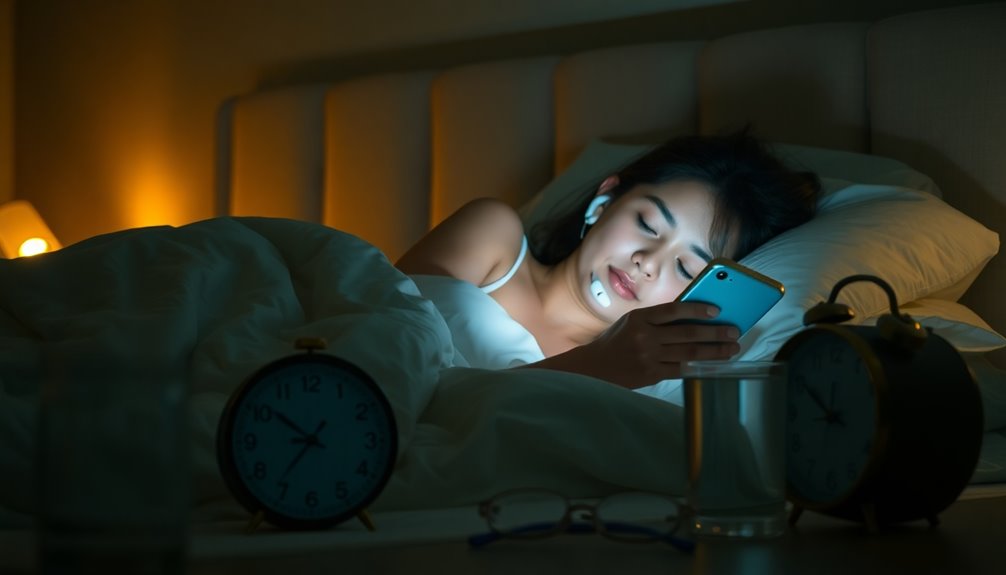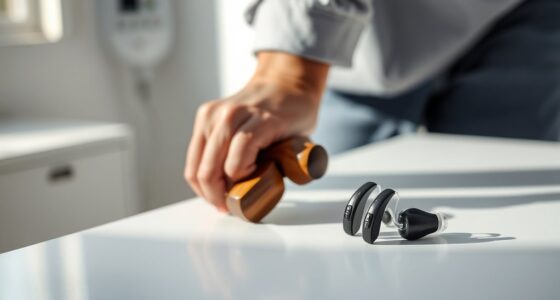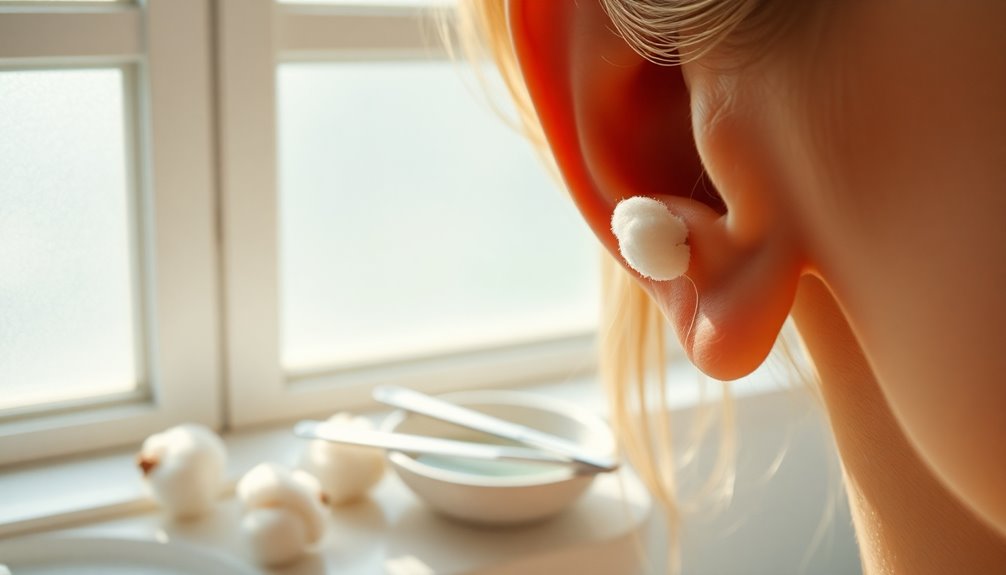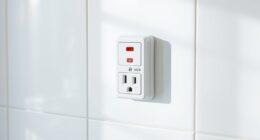Falling asleep with AirPods in isn't just a convenience; it can lead to several health issues you need to evaluate. You risk ear infections from trapped moisture and wax buildup, as well as hearing damage from prolonged exposure to high volume levels. Sleep quality also suffers as continuous sound disrupts your restorative cycles, leaving you groggy in the morning. Plus, there's a chance of battery malfunctions while you sleep. Finally, becoming dependent on audio can make falling asleep without them difficult. If you want to know more about these impacts, you'll find the details even more eye-opening.
Key Takeaways
- Sleeping with AirPods can lead to earwax buildup, increasing the risk of painful ear infections due to blocked drainage.
- Prolonged exposure to high volumes during sleep can cause serious hearing damage, especially with sounds over 85 decibels.
- Continuous audio can disrupt sleep cycles, leading to fragmented sleep and decreased overall sleep quality.
- Habitual use may create a psychological dependency on audio for sleep, complicating the ability to fall asleep naturally.
- Overnight use of AirPods raises battery safety concerns, including potential overheating and malfunctions during sleep.
Ear Health Risks

When you fall asleep with AirPods in, you might unknowingly put your ear health at risk. Sleeping with these earbuds can lead to earwax accumulation, as they create a barrier that prevents natural drainage. This buildup can become problematic, leading to impacted earwax near the eardrum and increasing your chances of developing painful ear infections.
The warm, moist environment created by wearing AirPods while you sleep is a perfect breeding ground for bacteria, heightening the risk of these infections.
Moreover, prolonged use of earbuds can cause physical discomfort. You may wake up with ear pain or soreness due to the pressure they exert on your ears. Continuous exposure to audio while you sleep can disrupt your sleep cycles, resulting in less restorative sleep, which can also affect your overall ear health.
To mitigate these risks, make it a habit to regularly clean your AirPods, as debris and earwax can contribute to hygiene-related issues and skin irritation.
Protecting your ears is essential; ignoring these health risks may lead to hearing loss down the line. Prioritize your ear health and consider alternative ways to enjoy audio while you sleep.
Hearing Damage Potential
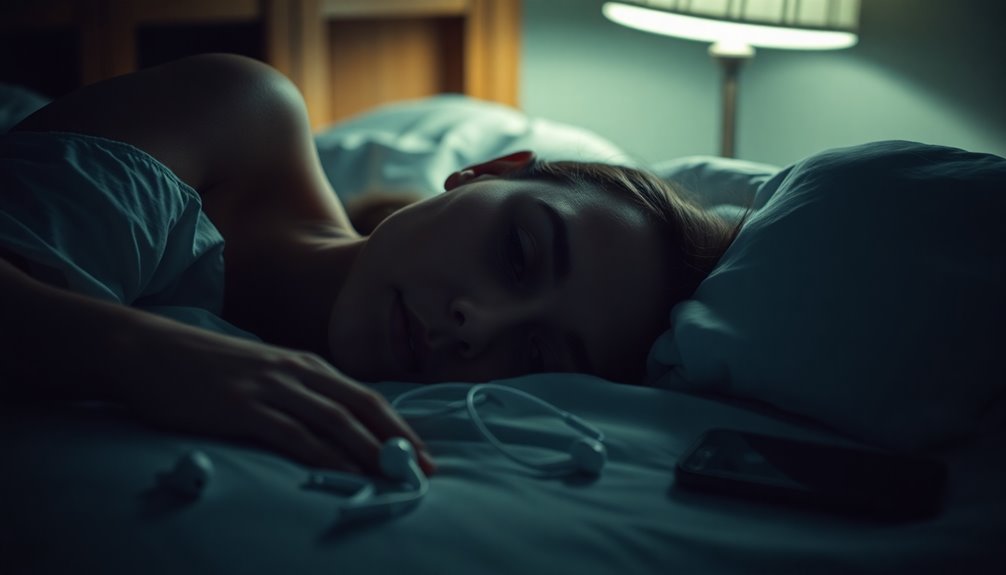
When you fall asleep with AirPods in, it's easy to lose track of the volume you're listening to, which can lead to serious hearing issues.
Prolonged exposure to sounds over 85 decibels, even at lower levels, can strain your ears and increase your risk of noise-induced hearing loss.
Being aware of your volume levels is essential for protecting your hearing health, especially during those long hours of sleep.
Volume Level Awareness
While many people enjoy drifting off to music or podcasts through their AirPods, it's vital to be mindful of volume levels to protect your hearing. The risk of noise-induced hearing loss increases markedly when you listen at high volumes, especially during prolonged periods. Earbuds, like AirPods, amplify sound directly into your ear canal, making volume level awareness important.
Research shows that sounds over 85 decibels can lead to permanent hearing damage, which is concerning when you consider that sleep durations can exceed 8 hours. If you listen at high volumes while you sleep, you're exposing yourself to potentially harmful sound levels for an extended time.
Ideally, the noise level for sleep should hover around 30 decibels, close to a whisper, emphasizing the significance of keeping your AirPods at lower volumes.
Even continuous audio exposure at lower volumes can strain your ears over time, leading to cumulative health effects. To safeguard your hearing, take breaks from sound and monitor your volume settings closely.
Prioritizing volume level awareness while using AirPods at night can help you enjoy your audio without jeopardizing your hearing health.
Prolonged Exposure Risks
Prolonged exposure to loud sounds can seriously compromise your hearing health, especially when using AirPods during sleep. Listening at high volumes while you snooze increases your risk of hearing damage. Since earbuds amplify sound directly into your ear canal, the danger grows with extended use.
Here are some critical factors to reflect upon:
- Sounds over 85 decibels can lead to hearing loss.
- Continuous audio exposure during sleep may exceed 8 hours.
- High volumes, even briefly, can strain your ears.
- The ideal noise level for sleep is around 30 decibels.
Being aware of volume levels is essential for your health and safety. Background noise can mask actual sound levels, causing you to inadvertently crank up the volume.
Over time, this prolonged exposure to loud sounds can lead to irreversible damage. If you want to enjoy audio while sleeping, think about lowering the volume and limiting your listening time.
Protecting your hearing now can save you from serious consequences later. Make sure to prioritize your ear health by being mindful of how long and how loud you're listening, especially when drifting off to sleep with AirPods in.
Noise-Induced Hearing Loss
Listening to audio at high volumes through AirPods can greatly heighten your risk of noise-induced hearing loss (NIHL). Prolonged exposure to sounds over 85 decibels is especially dangerous, as it notably increases the likelihood of permanent hearing impairment.
You might think that lower volumes are safe, but even listening at a low level for extended periods can strain your ears over time.
When you're trying to sleep, the ideal noise level is around 30 decibels, akin to a whisper. Unfortunately, many users crank up the volume far beyond this safe threshold, risking their hearing health.
Continuous audio while you sleep can disrupt your natural sleep cycle, leading to fatigue and discomfort when you wake up. Additionally, constant exposure to loud sounds can lead to ear pressure during colds, compounding the risk of discomfort and potential damage.
To protect your hearing, it's essential to regularly check your volume settings and maintain safe volume levels. Consider using your AirPods at lower volumes or setting a timer to limit your listening time.
Sleep Quality Disruption
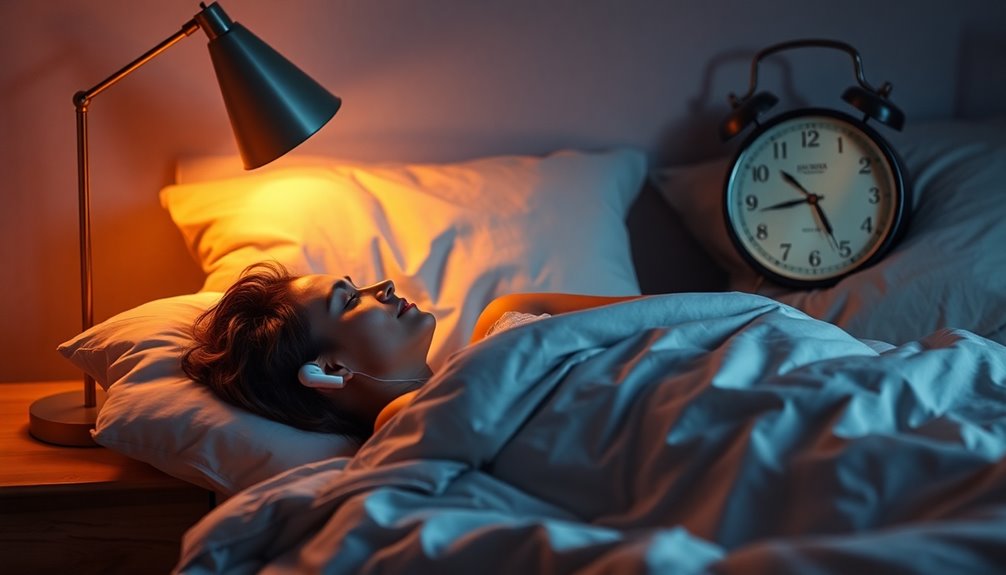
Using AirPods while you sleep can disrupt your sleep cycle, which might leave you feeling groggy in the morning.
The continuous sound can create fragmented sleep patterns, making it harder for you to reach those restorative sleep stages.
Plus, the physical discomfort from wearing earbuds can add to restless nights, further impacting your overall sleep quality.
Sleep Cycle Interference
Falling asleep with AirPods in can disrupt your sleep cycles considerably. Continuous audio exposure might prevent you from entering deeper stages of restorative sleep, which is crucial for ideal sleep quality.
Here are some key points to reflect on regarding sleep cycle interference:
- Reduced REM Sleep: Prolonged listening can diminish the time you spend in REM sleep, essential for cognitive function and emotional well-being.
- Increased Noise Levels: Earbuds typically amplify sound directly into your ear, potentially raising your exposure to disruptive noise levels beyond the preferred 30 decibels.
- Fragmented Sleep Patterns: The presence of audio can lead to interruptions in your sleep architecture, resulting in less restorative sleep and increased fatigue upon waking.
- Long-term Health Risks: Disruption of your sleep cycles may contribute to increased stress levels and impaired memory function over time. Regular screenings for sleep-related issues can help identify potential problems before they escalate.
Fragmented Sleep Patterns
Fragmented sleep patterns can considerably undermine your overall sleep quality when you wear AirPods to bed. Continuous audio exposure during sleep can disrupt your sleep cycles, particularly the essential REM and deep sleep stages. These stages are fundamental for restorative rest, and when they're interrupted, you might find yourself waking frequently throughout the night.
Studies show that earbuds can lead to increased wakefulness and decreased sleep efficiency. As a result, you may struggle to shift between sleep stages, which can leave you feeling fatigued and groggy upon waking. The distraction from audio content can prevent your brain from fully relaxing, making it challenging to achieve uninterrupted sleep.
This disruption can also affect your daytime alertness, impacting your overall performance and mood. If you notice increased grogginess or difficulty focusing during the day, it may be time to reconsider your bedtime habits.
In short, while AirPods can provide entertainment or relaxation, the potential for fragmented sleep patterns outweighs the benefits, leading to poor overall sleep quality. Prioritizing uninterrupted sleep is vital for maintaining your health and well-being. Additionally, poor sleep quality can negatively impact your emotional regulation, making it even more crucial to establish healthy sleep habits.
Restorative Sleep Deprivation
Restorative sleep is essential for your physical and mental well-being, yet wearing AirPods to bed can greatly disrupt this important process. The constant audio stimulation from your earbuds interferes with your sleep cycles, particularly the deep sleep stages critical for recovery and rejuvenation.
As a result, you might experience several health risks such as:
- Fragmented Sleep: The presence of AirPods can lead to interrupted sleep patterns, making it hard for you to reach restorative sleep.
- Increased Fatigue: Waking up feeling less refreshed can become a common occurrence, leaving you tired throughout the day.
- Diminished Sleep Quality: Continuous audio exposure prevents your brain from entering necessary rest modes, reducing the overall quality of your sleep.
- Long-term Health Issues: Prolonged use of earbuds at night can hinder your ability to achieve restorative sleep, impacting your overall health.
Ultimately, while AirPods may offer convenience, the negative effects on your sleep quality could outweigh the benefits.
Prioritizing restorative sleep is essential, so consider tucking those AirPods away before you hit the pillow.
Physical Discomfort Issues
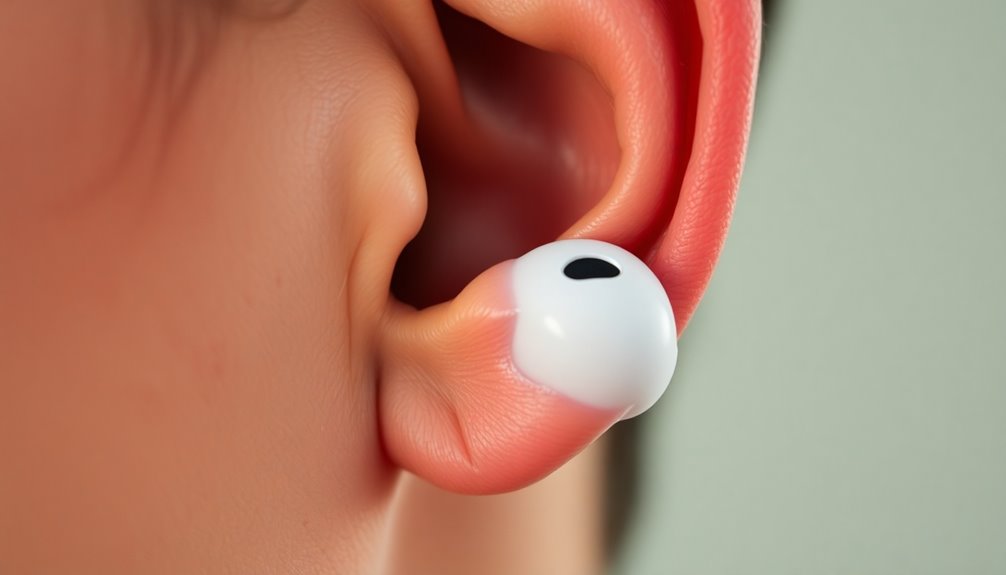
Using AirPods while sleeping can cause notable physical discomfort. You might experience ear pain or soreness due to the pressure these earbuds exert on your ears throughout the night.
If you toss and turn, the risk of dislodging the AirPods increases, which could lead to physical injury, like cuts or abrasions to your ear canal. Prolonged use can exacerbate discomfort, making it harder for you to find a comfortable sleeping position.
Over time, this discomfort might contribute to restless sleep, leaving you feeling less refreshed in the morning. If the earbuds aren't properly fitted, they can become lodged in your ear canal, possibly requiring medical intervention for removal.
Regularly using AirPods while you sleep may not only disrupt your immediate comfort but also lead to long-term issues affecting your overall ear health. You might find that the persistent discomfort impacts your sleep quality, creating a cycle that's hard to break.
Battery Safety Hazards
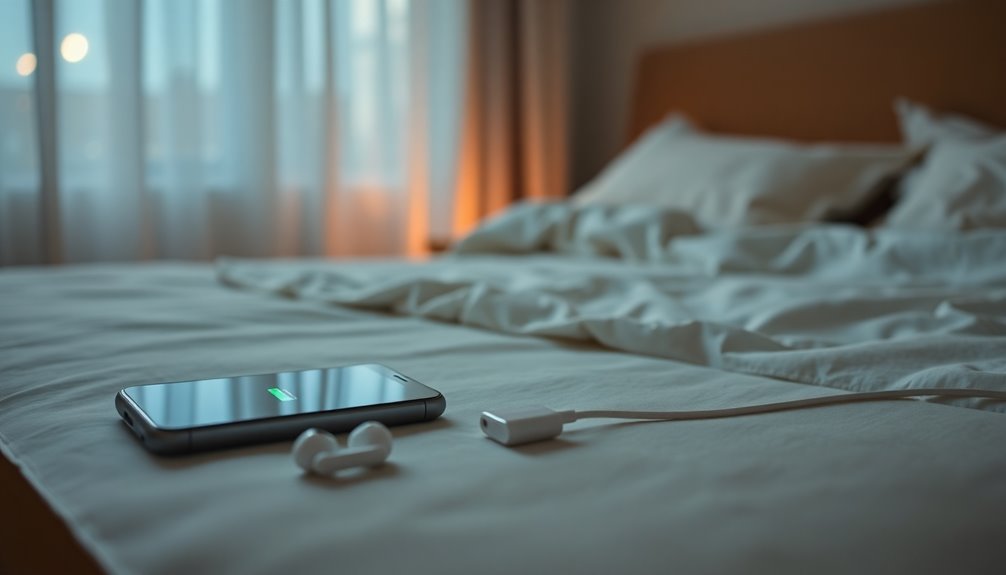
Sleeping with AirPods poses significant battery safety hazards that shouldn't be overlooked. When you wear them overnight, you mightn't be aware of battery malfunctions, which could lead to overheating or even fire hazards.
This risk is heightened by the fact that there have been reports of devices overheating during prolonged use, emphasizing the potential health risks involved. Regularly checking air quality indices can inform necessary actions to improve indoor air quality, which also applies to your overall health and safety.
To help mitigate these battery safety hazards, consider the following precautions:
- Charge with compliant adapters: Always use the manufacturer's recommended charging equipment.
- Inspect cables regularly: Avoid using damaged or frayed cables, as they can increase the risk of malfunction.
- Monitor battery condition: Check your AirPods for any signs of damage or swelling before use.
- Avoid extreme conditions: Keep your AirPods away from excessive heat or moisture to prevent battery-related incidents.
Dependency on Earbuds
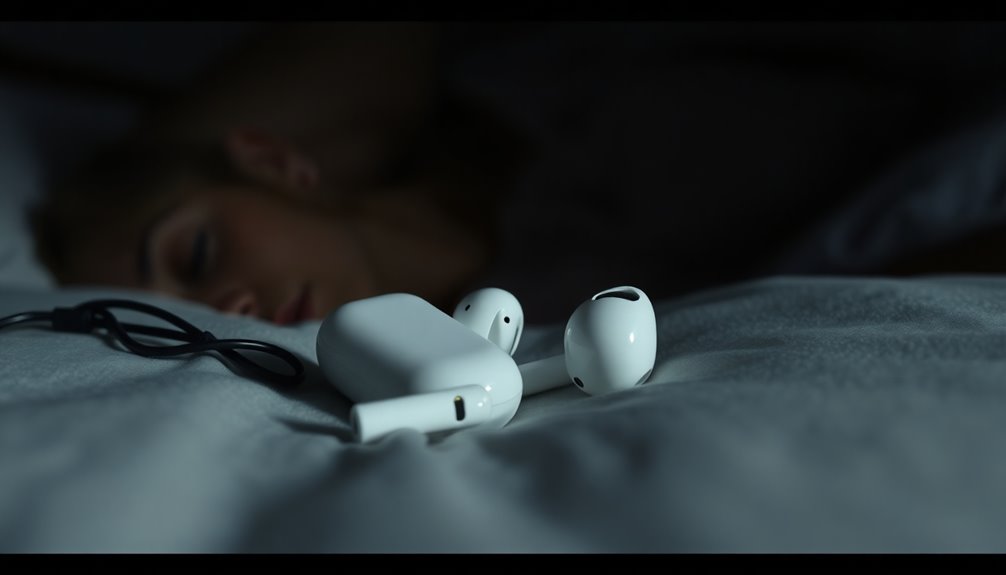
Many people find themselves developing a dependency on earbuds, especially when they become accustomed to using AirPods to fall asleep. This reliance can create a habitual need for audio stimulation, making it tough to drift off without the familiar sounds.
Over time, your brain may start to associate falling asleep with listening to audio, disrupting your natural sleep cycles. You might find it challenging to enter deep sleep without the presence of sound, which can greatly impact your sleep quality.
Moreover, frequent dependency on earbuds isn't just a matter of comfort; it can lead to health risks too. Prolonged use can cause ear health issues like wax buildup and potential infections.
These complications can further disturb your sleep, creating a vicious cycle of dependency. You might also feel anxious or restless when you don't have your AirPods, indicating a psychological reliance that affects your overall sleep hygiene.
It's crucial to recognize these patterns and consider healthier sleep habits. Reducing your dependency on earbuds could lead to better sleep quality and improved ear health in the long run.
Misconceptions About EMF
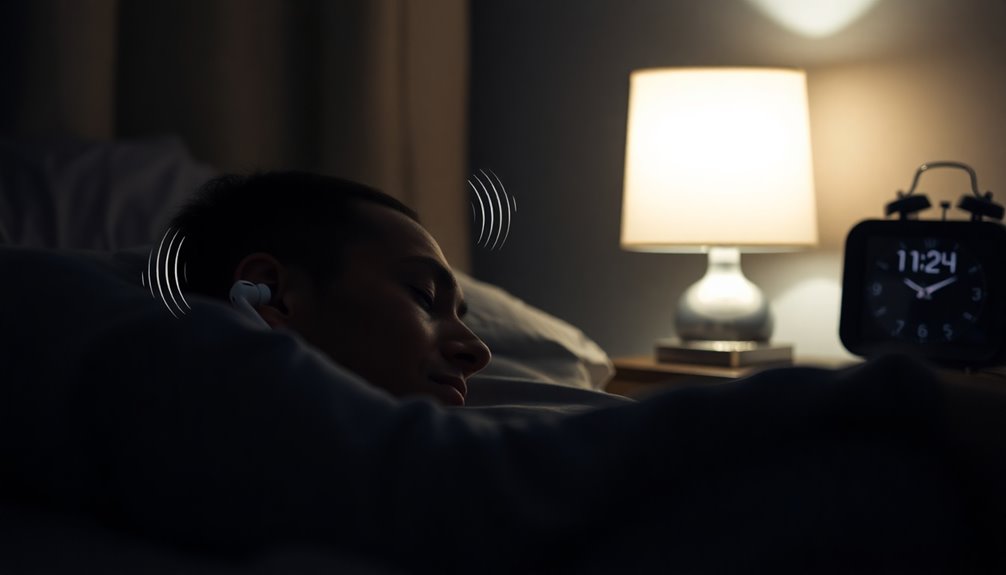
Your reliance on AirPods for sleep might lead you to wonder about the safety of the technology you're using. One major area of concern is the misconceptions about electromagnetic fields (EMF). Many people fear that wireless headphones pose serious health risks, but here's what you should know:
- Radiation Types: EMF from devices like AirPods is non-ionizing, considered low-level, and not linked to cancer risks like ionizing radiation (e.g., X-rays).
- Scientific Debate: While over 250 scientists have called for more research, definitive studies on the long-term effects of EMF exposure in humans are still lacking.
- Animal Studies: Some animal research hints at possible reproductive or neurological damage, but human evidence remains inconclusive.
- Regulatory Gaps: Current EMF regulations may not keep pace with the rapid evolution of wireless technology, leaving public safety standards uncertain.
Despite the International Agency for Research on Cancer labeling EMF as a possible carcinogen, the scientific consensus currently shows insufficient evidence to support claims of serious health risks from everyday AirPods use.
Health Guidelines and Recommendations
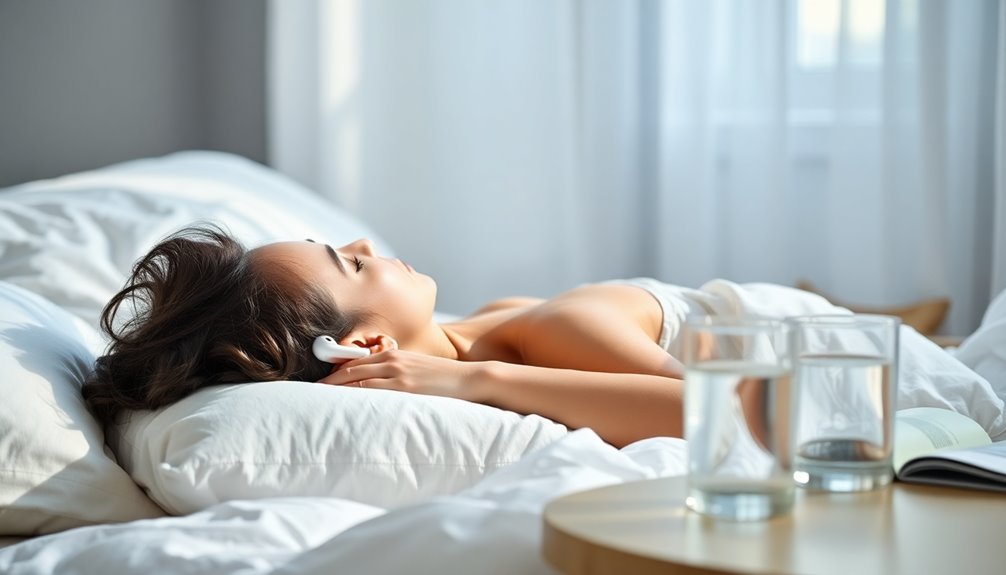
Using AirPods during sleep can pose several health risks that are important to contemplate. Prolonged use can lead to ear health issues like earwax buildup and a heightened risk of ear infections due to moisture accumulating in your ear canal.
To protect your ear health, consider keeping the volume low, as listening at high levels—over 85 decibels—can contribute to noise-induced hearing loss.
Experts recommend taking regular breaks from audio exposure to minimize strain on your ears and guard against potential permanent hearing impairment.
Cleaning your AirPods regularly is also essential; it helps maintain hygiene and prevents skin irritation or infections caused by debris and earwax.
For better safety while enjoying sound during sleep, explore alternative solutions like sleep masks with built-in headphones or headbands featuring speakers.
These options can provide comfort and sound without exposing your ears to the risks associated with in-ear earbuds.
Frequently Asked Questions
Is It Unhealthy to Sleep With Airpods In?
Sleeping with AirPods in isn't the best idea for your health.
You might experience increased earwax buildup and moisture, which can lead to infections. Prolonged exposure to sound can also harm your hearing over time.
Plus, they can disrupt your sleep quality, causing you to wake up feeling less rested. You may even feel discomfort or soreness in your ears.
It's crucial to reflect on these factors for your overall well-being.
Are Airpods Bad for Ear Health?
Imagine jamming out to your favorite tunes, but are AirPods bad for your ear health? Yes, they can be.
Using them regularly can lead to moisture and earwax buildup, increasing your risk of infections. Plus, they might create discomfort or soreness if you wear them too long.
Over time, neglecting hygiene can lead to chronic issues. So, if you love your AirPods, remember to clean them and give your ears a break!
Can I Fall Asleep With One Airpod In?
You can fall asleep with one AirPod in, but it mightn't be the best choice.
Using it could disrupt your sleep cycles, leading to fragmented rest. Plus, it may cause earwax buildup or discomfort in your ear, which can affect how well you sleep.
If you often listen at high volumes, you might risk noise-induced hearing loss.
It's better to give your ears a break and rest without earbuds whenever possible.
Can Sleeping With Earbuds Cause Ear Infections?
Yes, sleeping with earbuds can increase your risk of ear infections.
When you wear them for extended periods, it creates a moist environment in your ear canal, which can foster bacterial growth.
Plus, earbuds may push earwax deeper, leading to blockages and potential infections.
To minimize these risks, it's vital to clean your earbuds regularly and give your ears a break to ventilate and dry out.
Taking care of your ears is important for their health.
Conclusion
So, is it really worth the risk of falling asleep with AirPods in? While they may seem harmless, the potential for ear health issues, hearing damage, and disrupted sleep is too significant to ignore. You deserve restful nights and healthy ears. Imagine waking up refreshed, free from discomfort or dependence on your earbuds. Prioritize your well-being by setting them aside before you drift off. Your ears—and your sleep—will thank you for it!
